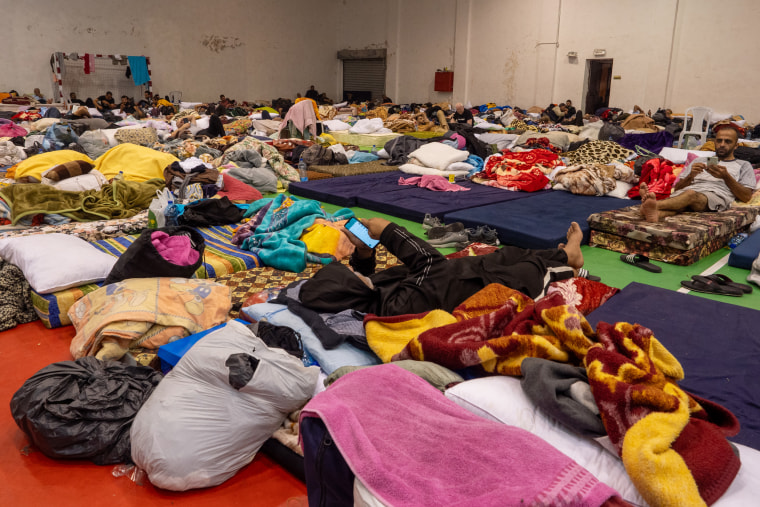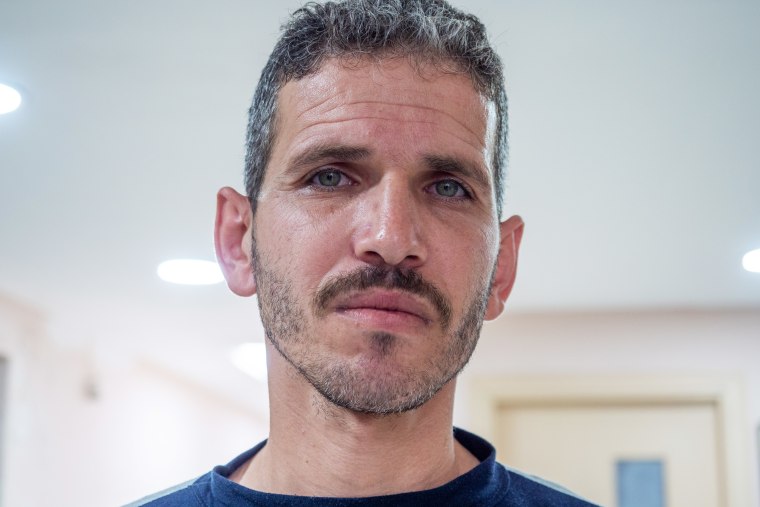RAMALLAH, West Bank — Nael’s hand shook and his eyes teared up as he tried to call his wife in Gaza, one of several attempts that day.
But with communications to the besieged Gaza Strip cut off since Friday by Israeli airstrikes, the response was the same old message asking him to try again later.
Nael, 37, a construction worker, who asked that his last name be withheld for security reasons, is one of hundreds of Gazan laborers who were working in Israel when Hamas attacked Oct. 7 and are now stranded in Ramallah in the occupied West Bank.
Around 18,500 Palestinian residents of Gaza had permits to work in Israel, rights groups say, most of them in construction and agriculture. But they were revoked soon after Hamas’ attacks, leaving the workers in limbo. So hundreds of laborers, including Nael, left their places of work to take shelter in a converted sports center in the West Bank, which is partly administered by the Palestinian Authority. Meanwhile, 50 miles away, the workers’ families are enduring intense Israeli bombardments that cut Gaza’s ability to communicate with the outside world over the weekend.
“There’s no connection, no information,” Nael said. “I don’t know if my family are living or not living.”
Rights groups say Palestinians from Gaza who no longer have active work permits are considered to be without legal status in Israel and could face arrest. So, many of the laborers are being hosted by Palestinian authorities in the West Bank in a variety of venues and private residences and helped by local volunteers who bring food and water.
At the sports center, Gazan workers are crammed into the main hall and sleep on foam mattresses or bedding on a soccer pitch outdoors. Laundry hangs on sports equipment as men mill about, passing the time the best they can.
On Saturday, some prayed and some bickered as tempers flared in the warm humid night, a strong smell of sweat hanging in the air.

Most were sitting or lying on mattresses surrounded by their few belongings, staring at their phones, desperate for information about relatives in Gaza amid reports of bombed-out buildings and broken bodies pulled from rubble.
Israel says it is targeting Hamas infrastructure, but civilian casualties have been heavy in the densely populated enclave. According to the Health Ministry in Gaza, more than 3,500 children have been killed there. Israel has not specified how many of its 1,400-plus reported deaths were among children.
Follow live updates on the Israel-Hamas conflict
Despite the extreme danger, some Gazan workers said they would rather be with their families than worry about their fates from a safe distance.
“We want to die with our families, our children. While they’re dying, we’re sitting here eating and drinking. We want to go back,” said a laborer who asked not to be named for safety reasons.
Israel’s Coordinator of Government Activities in the Territories, which handles its policy regarding the West Bank and Gaza Strip, has not responded to an inquiry about the workers’ legal status and why the permits were revoked.
Although some phone and internet communications in Gaza have gradually been restored since Friday, the network is still patchy, and the limited power available to charge phones in Gaza makes it difficult for those outside the area to get through.
“It’s been two days without information, and we’re hearing about massacres. We want for them to stop the aggression and to see our families and check on them,” said a middle-aged man sheltering in the sports center, who asked not to be named for security reasons.
Fathi Fahmi Abumarag, 60, a construction worker, was resigned to staring at photos of his family on his phone. He proudly pulled up a photo of himself and one of his sons on the day he graduated from university.
But it brings little comfort, he said.
“I don’t know what’s happened to him,” Abumarag said. “When you don’t have family, anywhere you go, there is no peace.”

